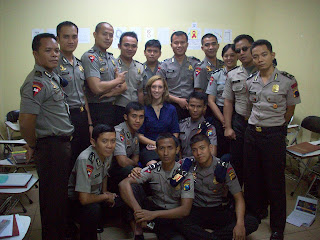Ok, ok, so we weren't going anywhere near orangutans or tribal villages where head hunting is still a major past time, but getting out of Java still made the trip well worth the while. So, Michael (another ELF in Jakarta) and I boarded the hour and a half flight for Pontianak.
The city of Pontianak is located on the west coast of Borneo, not too far south of Malaysia. There are a few wonderful things about this city. 1). There is another ELF there (Cary), whom we were going to get to see in all his teaching glory, 2). Three of my former police students are posted in the city (Robert - my adopted little brother, Edy, and Jhon), 3). The city is located on the equator, 4). The city is not located on Java, 5). There are no bajai, and 6). The city is a mix of numerous cultures each bringing their flavor to the city.
 |
| A few fun signs |
First off, Pontianak is a proper city about the size of Akron, and it's walker friendly. So, Michael and I spent a lot of time doing just that - we walked. The traffic was still pretty heavy, but the air was perfectly pleasant. The most notable difference (apart from the lack of bajai, which were replaced with the much cleaner and less noisy becek - bicycle ricksaws) was that there were far fewer foreigners. This meant far more attention for two tall bules getting lost on the main streets of the city. On more than one occasion, a friendly and curious citizen crossed traffic and pull up alongside us on their motorbike to talk about...anything. Here's a typical conversation:
Citizen: Halo, mister (regardless of gender being addressed)! Where are you going?
Bules: Halo! Over there. (points with thumb in any general direction - pointing with fingers is very disrespectful)
Citizen: Where are you from?
Bules: America!
Citizen: America! Obama!
All: Obama, ya! (much laughter and high fives).
This is where the conversation usually died out because of a lack of English proficiency, but it was a enough to generate smiles all around. Sometimes there were no words exchanged at all. One such memorable moment, I was standing outside of a shopping mall when an older woman caught my eye. She pointed to her nose, then my nose, then her daughter's nose, and said, "sama" with an ear to ear grin. You see, while in America it's typical to desire small noses, here in Asia a big shnoz is a mark of beauty. I've even heard that it is thought if a bule touches a baby, he or she will grow into a fine "bule" nose. This woman was fiercely proud of the fact that her daughter possessed a nose just like mine. Light skin and big noses - I may never leave (just kidding, Mom!).
In between these great little, impromptu conversations, we had some great adventures. One night we got to meet with my former students for dinner. I also had the extra special treat of meeting Robert's (far left) little twin sisters, Richa and Reni. These girls are adorable and have joined Robert in my growing Indonesian family.
We also visited Cary's English club, which was staging its very own version of Charles Dicken's A Christmas Carol. They did an extraordinary job, and officially put me in the Christmas spirit!
Of course, we had to go visit the equator. There is a special monument built by the Dutch to mark the spot.
 |
| Straddling the Equator. Sweet! |
 |
| Michael and his official Equator certificate |
We rounded off the trip with a visit to the oldest mosque in the city and the sultan's palace.
 |
| Stain glass and prayer rugs |
 |
| House on stilts. |
Add one more thumbtack to my map! When I make it to my next island, you'll hear about it.














































